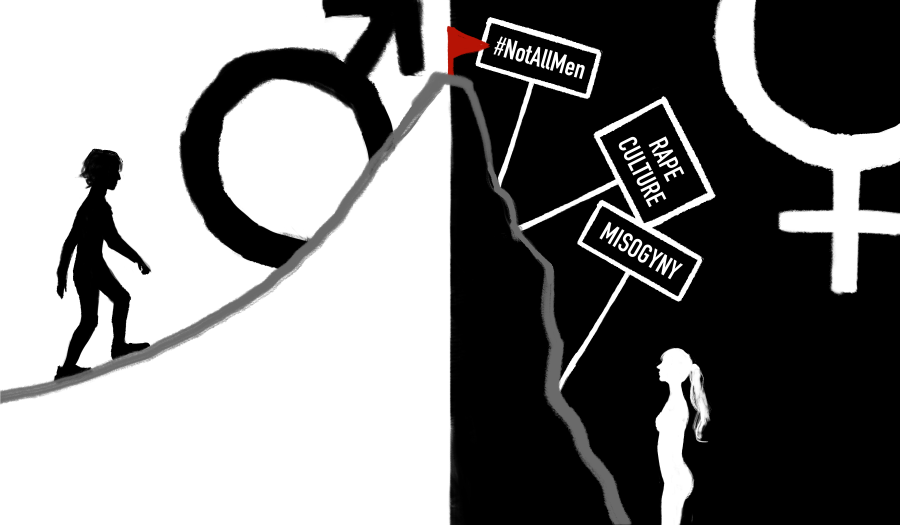The ability to hijack power is not a strength.
On March 13, women united in London to honor their fallen sister, Sarah Everard, at a candlelit vigil. They came to offer light and hope in a time of great fear and darkness for girls. Their peaceful resolve, however, was met with violence. Their flames were smothered. Rallying behind a fellow woman who was kidnapped and killed by a misogynist is not a crime. On the contrary, these women were part of a righteous movement. Yet this upheaval against the culture of toxic masculinity has led many sexists to point to what men perceive as the “frail nature” of women. This culture also harbored the #NotAllMen countermovement, which aimed to denigrate the experiences of assault victims by essentially brushing off accountability from society for the prevalence of sexual assault. Everybody knows that not all men assault women. But many of us also realize that there is a huge sense of complacency to back women as they speak up, in the name of masculinity. Brutish dominance is not a strength, and it is time to eradicate the current equation between the two. The #MeToo movement is not a movement of weakness, but #NotAllMen is. Women have had to brave convoluted paths to success as their fortes are often misrepresented as weaknesses. This assumption of weakness despite the presence of strength must go.
According to a study by the Pew Research Center, women possess the same qualities that are expected from an effective leader. These qualities include ethicality and empathy. These are believed to be essential qualities in a strong leader, yet in women, these are often seen as signs of a weak person. Men do not inherently have some trait that merits their placement above women in societal or workplace hierarchies. Instead, the value of the very characteristics that are conventionally associated with leadership is diminished when present in a woman.
In fact, we saw this in the aftermath of Everard’s killing. When women voiced concerns over their safety in light of this tragedy, the city of London urged women to stay home after dusk. Instead of awarding the powerful initiative of these women with more restrictions on potential perpetrators, the city resorted to suggesting restrictions based on the false idea that female victims are too meek to be allowed freedom. The feminist movement’s proposals were twisted to subtly victim-blame, to find faults in females’ resolve. In isolation, this reaction would be an unfortunate anomaly. In reality, this event is one of many.
When women like Vice President Kamala Harris are finally able to wrestle through initially discrete misogyny, like what the protesters in London faced, their success itself becomes evidence of the woman’s “weakness.” Harris’ gender made her success unbelievable. So instead, her climb up the political ladder was perceived by misogynists as her Achilles’ heel. Instead of offering dignified critiques or congratulatory remarks on Harris’ victories, her rivals accused her of fornicating with members of the political elite to get ahead. It is hard to imagine people issuing similarly baseless claims on men to assert, among other things, the supposedly manipulative nature of the targeted person. Even Harris’ wins became kindling for a movement itching to uncover a weak link where there is nothing of the sort.
Hijacking power does not show strength. In fact, it shows cowardice. It shows an inability to rise fairly. A man who rapes women is a liability on society, not his victims. A male boss who silences female coworkers is a liability; a woman who rises despite his oppressive tactics is not. A man who urges sexist restrictions on female activity in the dark is a liability; a woman who asks for a curfew on all citizens is not. Apart from shifting blame, some simply rely on hypocrisy to diminish women’s standing. But the merit of qualities such as compassion does not vary with the gender that possesses them.
Women have had to change their pace. But it’s not to catch up to men. Instead it’s to run the other way. Instead it’s to redefine the meaning of strength. Strengths are characteristics that are assets to the advancement of both the wielder and everyone else. Utilizing these attributes does not necessitate the subordination of half of the human population.
It is time to stop warping the meaning of strength so that it forever stays out of the reach of women.
Art by Angela Liang for the UC San Diego Guardian.

















Ashipa • Apr 29, 2021 at 3:14 pm
Women have been really empowered in the latest years, so the dating scene has become much more interesting. If you want to know how to adapt to these changes using online dating platforms, check this out to be prepared. These guys put out articles that will get you up-to-date on the most popular dating websites that have lots of partners available.
Elisabeth • Mar 29, 2021 at 5:13 am
Women’s health needs constant monitoring. Contact the doctor representatives of the fair sex should not only in the presence of symptoms of various pathological processes and diseases, but also for the purpose of preventive examinations, gynaecologists in Singapore. Consultation with a gynecologist is mandatory at least once a year!